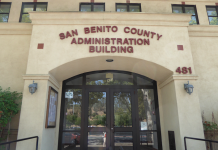Gilroy
– For the most part, sovereign Indian tribes are free to ignore
local and state taxes and laws when building casinos. A few
California tribes, however, do strike deals with counties to pay
for the local impacts.
Gilroy – For the most part, sovereign Indian tribes are free to ignore local and state taxes and laws when building casinos. A few California tribes, however, do strike deals with counties to pay for the local impacts.
Meetings with Santa Clara and San Benito county supervisors may mean that’s the way local investors are leaning as they team up with a non-local Miwok Indian band to build an estimated $300 million casino resort on state Highway 25 in San Benito County, close to the Santa Clara County line.
According to the governor’s California Performance Review, five of the 34 counties with existing or proposed Indian casinos have Memorandum of Understanding-type agreements with the tribes. The other 29 counties are getting nothing to mitigate impacts on local traffic, water, sewers, air and emergency services like police and fire.
Perhaps the biggest of these agreements is between Yolo County, just north of Sacramento, and the Rumsey Band of Wintun Indians, who run the Cache Creek Casino Resort in Brooks. In 2002, as Cache Creek was preparing to expand, a deal was struck in which the tribe would pay the county $100 million to mitigate the casino’s impact.
Phillip Thompson, a Washington, D.C. lawyer who represents the local casino investment group, said their Highway 25 resort would be comparable to Cache Creek.
Cache Creek, according to its Web site, “encompasses 66,000 square feet of casino space featuring 1,762 slot machines and more than 120 table games.”
The 415,000-square-foot property also includes a 200-room luxury hotel and health spa, eight restaurants, an entertainment venue, a 20,000-square-foot event center, outdoor swimming pool, casino gift shop and tribal-operated mini mart, gas station and fire station, according to the Web site.
Local casino investors have already told San Benito County Sheriff Curtis Hill they would build a station for his deputies on the casino property, but Hill staunchly opposes the project.
Like the local proposal, Cache Creek is located on a rural state highway and is near a major city (Sacramento) and a major highway (Interstate 5).
Yolo County spokeswoman Suzanne Mikesell said her county has gone to great lengths to deal with the casino. Part of the 2002 agreement established an Advisory Committee on Tribal Matters, in which community volunteers review casino impacts and make recommendations about how to spend the tribe’s mitigation payments.
The county and tribe also established a “two-by-two” committee, consisting of two appointed county supervisors and two designated tribal officials. The team meets regularly
in public to discuss issues between the two governing bodies.
The county also hired a tribal affairs analyst, and Yolo County Supervisor Mike McGowan is currently the chairman of the California State Association of Counties’ gaming committee.
“You can see we have a lot of ways of addressing this,” Mikesell said.
That’s necessary, she said, considering the casino’s growth.
“They have a resort hotel now,” Mikesell said. “They’re building a golf course. They are in an expansion mode”
Peter Crowley is a staff writer. He can be reached at 408-847-7109 or by e-mail at pc******@************ch.com.









